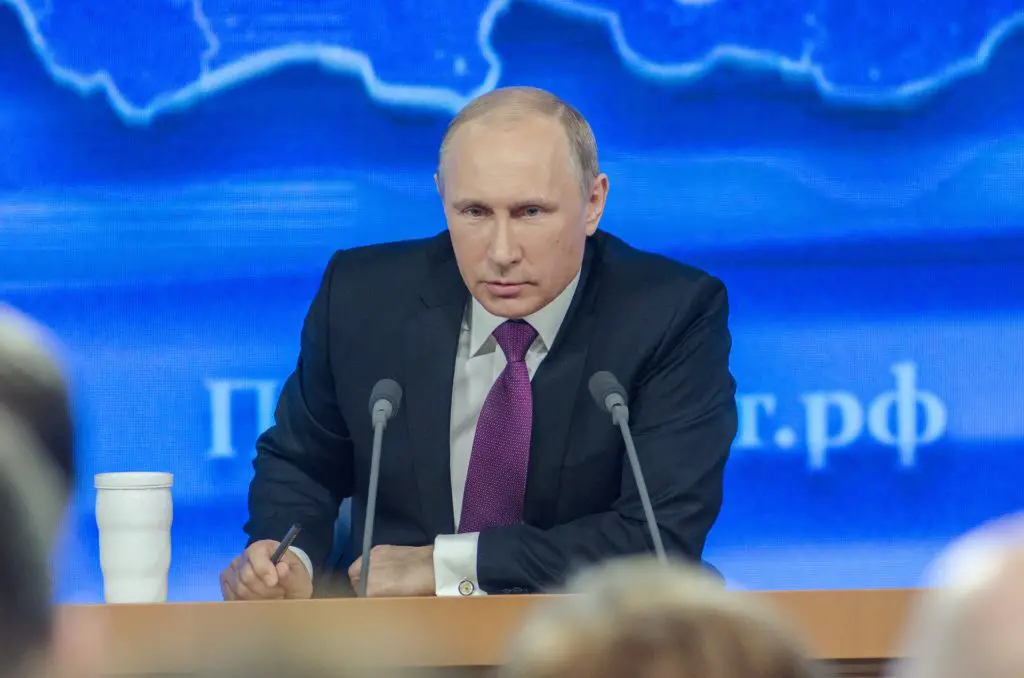Russian president Vladimir Putin criticized the United States in his annual address to the nation in October 2018, saying that American influence in the world has irrevocably waned.
Left-leaning political news site AmericanIndependent.com reported on his comments in a story that was later picked up by Shareblue.com:
Speaking about the position of the U.S. on the global stage, Putin celebrated the waning influence of what he described as America’s “monopoly” on power, saying it would give Russia the ability to exert more influence in the world.
“Empires often think they can make some little mistakes. Because they’re so powerful,” Putin said, according to the Financial Times. ”But when the number of these mistakes keeps growing, it reaches a level they cannot sustain.”
He admonished the U.S. for having a “sense of impunity,” saying, “This is the result of the monopoly from a unipolar world.”
“Luckily this monopoly is disappearing,” he added. “It’s almost done.”
And Russia’s time has come, he said, claiming that America’s downfall meant that Russia had an opportunity to establish itself as a major player on the global stage.
Whether or not it is true that the United States is losing its foothold as a global power — or whether Putin actually believes it — is a matter of political debate, but what is not is whether Russia’s president actually said this: he did.
“Thank God, this situation of a unipolar world, of a monopoly, is coming to an end,” Putin said. “It’s practically already over.”
Putin added that he wasn’t trying to offend anyone with his remarks and that he believed the end of American dominance would make the world more balanced and allow for more international dialogue.
Russia, Putin said, was ready for a better relationship with the U.S. at any time.
The Russian president also defended President Donald Trump, saying he didn’t agree with characterizations that Trump only listened to himself.
The October 18, 2018 statement came the same week that the United States Department of Justice formally announced charges against Russian national Elena Alekseevna Khusyaynov for interfering in the U.S.’s 2016 presidential and general elections to attempt to bring about specific outcomes and spread chaos within the public discourse:
“This case serves as a stark reminder to all Americans: Our foreign adversaries continue their efforts to interfere in our democracy by creating social and political division, spreading distrust in our political system, and advocating for the support or defeat of particular political candidates,” said Director Wray. “We take all threats to our democracy very seriously, and we’re committed to working with our partners to identify and stop these unlawful influence operations. Together, we must remain diligent and determined to protect our democratic institutions and maintain trust in our electoral process.”
According to the criminal complaint, the 44-year-old Khusyaynova served as the chief accountant of “Project Lakhta,” a Russian umbrella effort funded by Putin-linked Russian oligarch Evgeny Prigozhin (also known as “Putin’s Chef“) along with two of his companies, Concord Management and Consulting LLC, and Concord Catering:
The alleged conspiracy, in which Khusyaynova is alleged to have played a central financial management role, sought to conduct what it called internally “information warfare against the United States.” This effort was not only designed to spread distrust towards candidates for U.S. political office and the U.S. political system in general, but also to defraud the United States by impeding the lawful functions of government agencies in administering relevant federal requirements.
The conspirators allegedly took extraordinary steps to make it appear that they were ordinary American political activists. This included the use of virtual private networks and other means to disguise their activities and to obfuscate their Russian origin. They used social media platforms to create thousands of social media and email accounts that appeared to be operated by U.S. persons, and used them to create and amplify divisive social and political content targeting U.S. audiences. These accounts also were used to advocate for the election or electoral defeat of particular candidates in the 2016 and 2018 U.S. elections. Some social media accounts posted tens of thousands of messages, and had tens of thousands of followers.
- United States Department of Justice. "Russian National Charged with Interfering in U.S. Political System."
- Osborn, Charlie. "Project Lakhta: Russian national charged with US election meddling."
- Reevell, Patrick. "Russian President Vladimir Putin says US dominance is ending after mistakes 'typical of an empire'."

